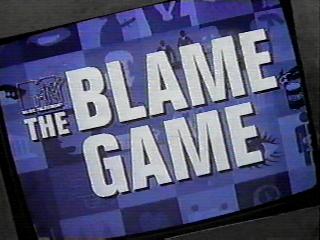
THE BLAME GAME
Caeci tamen ducem quaerunt, nos sine duce erramus et dicimus: "Non ego ambitiosus sum, sed nemo aliter Romae potest vivere. Non ego sumptuosus sum, sed urbs ipsa magnas inpensas exigit. Non est meum vitiam, quod iracundus sum, quod nondum constitui certum genus vitae; adolescentia haec facit." Quid nos decipimus? Non est extrinsecus malum nostrum, intra nos est, in visceribus ipsis sedet.
"The blind desire a guide; we, without a guide, wander around and say: 'I am not ambitious; nobody can live in Rome by any other way. I am not sumptuous; the city itself requires great provision. It is not my fault that I am irascible and that I have not settled down in any one way of life; it is the fault of adolescence.' Why do we deceive ourselves!? Our evil is not outside of us; it is rooted in our very own inner parts!"
-Seneca's Moral Epistle L
Even Seneca, a pagan philosopher, could conclude that "our evil is not outside of us." Our evil is rooted in our very selves. It is amazing how difficult it is for human beings to take responsibility for the evils they commit. It is certainly difficult for me to identify my own evils! It is so much easier to simply suggest that the evil deeds I commit are somehow involuntarily elicited from me by outside forces.
Christians of my persuasion (Lutherans) use a Latin phrase to describe the dual nature of the Christian: simul justus et peccator; "simultaneously saint and sinner." We are both 100% saint and 100% sinner! We don't HAVE a sinful nature and a divine nature, we ARE both; in the same way, we don't HAVE a body but ARE a body.
What does this mean? We don't HAVE a sinful nature; we ARE 100% sinful. Our evil is bound up in our very selves. It is not external to us. This means that the proper attitude of the Christian is not blame, but responsibility; with responsibility, the acknowledgment that we ARE the very thing we hate - odium se, "hatred of self." This is not a sense of depression, low self-esteem, or any other psychologically negative mindset. It is rather a realistic, reasonable (even Stoic?) assessment of oneself. Such an escape from the blame-game leads one only to despair of one's own goodness.
What is the result? According to Seneca, it is universally understood as obvious that only a foolish blind man would not seek a guide. He is, after all - blind. What is the result of despairing of one's own goodness? We seek goodness outside ourselves, just as a blind man seeks sight outside of himself. He would be foolish to do otherwise. He would be foolish to blame the light for failing him when the blindness is in himself. It is a waste of time. Likewise, it is only a fool that blames others for the sin that is in his very own inner parts.
For Christians, Seneca advises a reasonable, conscious discipline of thought - a metacognitive discipline of tracing each evil deed and thought back to its root deep within us. When I lose my temper, I must trace my loss of control to some fault in myself; I cannot blame it on the person who angered me. Likewise with every fault, sin, and evil.
For Seneca, the constant gardening of one's own nature - constantly finding the roots of evil and pulling them up - takes place under the guidance of another better than oneself. For Christians, this painful removal of evil's tendrils is entirely the work of our Lord, Jesus Christ. Still, the discipline of tracing our evils into our very own selves, acknowledging them, owning them, and hating them drives us to despair of ourselves and to confess honestly our sinful acts and even nature with genuine repentance.
It is a difficult discipline, this taking responsibility, but its necessity is obvious to any reasonable person - even a pagan. Only a blind fool refuses to admit his blindness and take the hand proferred to guide him.
-Lucilius
Jesus said, "For judgment I came into this world, that those who do not see may see, and those who see may become blind." Some of the Pharisees near him heard these things, and said to him, "Are we also blind?" Jesus said to them, "If you were blind, you would have no guilt; but now that you say, 'We see,' your guilt remains.
-St. John's Gospel (9:39-41, ESV)
Seneca's writings are available from Harvard University Press' Loeb Classical Library: http://www.hup.harvard.edu/loeb/
3 comments:
More brilliance from Seneca’s pupil… Of course, it is Christ who works, but would it also be salutary to say that Christ, who uses mediators, could work through the care of a confessor?
-R. Contra Mundum
The discipline of tracing our evils into our very own selves, acknowledging them, owning them, and hating them drives us to despair of ourselves and to confess honestly our sinful acts and even nature with genuine repentance.
Of course the genuine confession that results from the discipline suggested in the post would be very appropriate in the context of Private Confession and Absolution.
Where odium se increases as a result of the habitus described by Seneca, the depth of one's need for a sure, objective Word of forgiveness from our Lord also increases!
Thank you for an insightful discussion.
Post a Comment